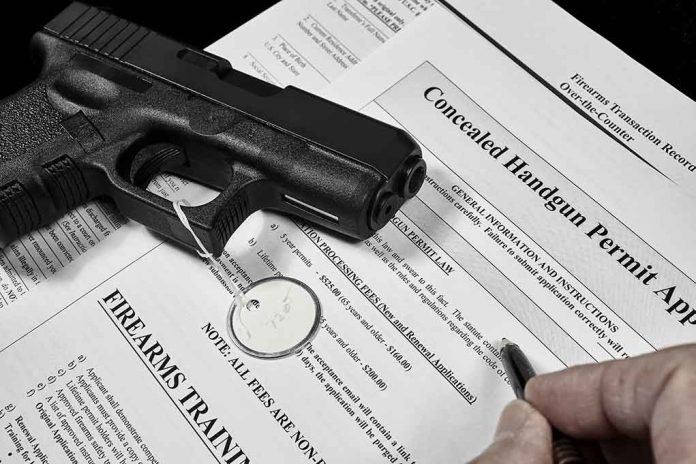
A landmark decision by a federal judge has declared New York’s concealed carry ban on publicly accessible private property unconstitutional, reshaping the state’s firearm regulations.
At a Glance
- Federal judge rules New York’s concealed carry ban on public-accessible private property unconstitutional.
- Case supported by Second Amendment Foundation, highlighting lack of historical legal backing.
- Judge notes the state’s failure to align restriction with the national tradition.
- Decision emphasizes self-defense rights and challenges New York’s gun regulation efforts.
Court Ruling on Concealed Carry
On October 11, 2024, U.S. District Judge John L. Sinatra Jr. issued a decision in favor of individual rights by ruling that New York’s ban on concealed carry on publicly accessible private property is unconstitutional. This decision came from the case Christian v. James, which involved the Firearms Policy Coalition, the Second Amendment Foundation, and plaintiff Brett Christian. Judge Sinatra stated that there is no historical tradition supporting such restrictions, referencing pivotal cases like Heller, McDonald, and Bruen.
Legal experts note this judgment signifies a notable shift in New York’s approach to regulating firearms, primarily focusing on protecting the citizens’ constitutional right to self-defense. Such rulings reinforce that legal carrying laws must align with longstanding historical practices recognized in national traditions, which was a key point in Judge Sinatra’s decision making.
Implications for Gun Rights Advocacy
The ruling delivered by Judge Sinatra had backing from gun rights proponents like the Second Amendment Foundation. Bill Sack, the SAF Director of Legal Operations, criticized New York’s restrictions as unconstitutional. The state failed to show the restriction as aligned with national tradition, undermining New York’s precedent-setting intentions for broader gun regulation.
Judge Sinatra’s judgment could set the tone for possible challenges across other states attempting to impose similar restrictions. This decision challenges New York’s attempt to create a model for post-Bruen regulations, illustrating judicial acknowledgment of Second Amendment rights and the constitutionality of carrying in certain public and private spaces.
The governor yesterday: https://t.co/OQWFKH1swa https://t.co/VfqveL8zhJ pic.twitter.com/LxlQR4qn9p
— Firearms Policy Coalition (@gunpolicy) October 10, 2024
Related Judicial Decisions
The decision dovetails into broader judicial actions affecting New York’s safe harbor regulations. Another judge previously blocked sweeping provisions of New York’s gun laws, including bans on carrying firearms in “sensitive” places such as museums and theaters, reflecting ongoing litigation over what constitutes permissible restrictions under New York’s Concealed Carry Improvement Act.
“The state points to no historical law conditioning lawful carriage of a firearm on disclosing one’s pseudonyms or, more generally, on informing the government about one’s history of speech,” the appeals court said.
This ongoing legal battle underscores the struggle to balance public safety measures with constitutionally enshrined rights. While most restrictions of the Concealed Carry Improvement Act withstand judicial scrutiny, including good moral character assessments and sensitive location bans, this latest ruling highlights legal limits on imposing site-specific carrying exclusions.
Sources:
FED. JUDGE SAYS NY’S PRIVATE PROPERTY CARRY RESTRICTION IS UNCONSTITUTIONAL
Federal Judge Blocks N.Y. Gun Law, Finding Much of It Unconstitutional
New York can’t ban concealed carry by default on private property open to public, 2nd Circuit says
US appeals court allows many New York restrictions on carrying guns
Judge blocks New York restrictions on guns on private property
In 6-3 ruling, court strikes down New York’s concealed-carry law
Supreme Court orders new decision on N.Y.’s concealed carry law
Court Strikes Down Part Of Blue State’s Restrictive Gun Law In Win For Second Amendment













